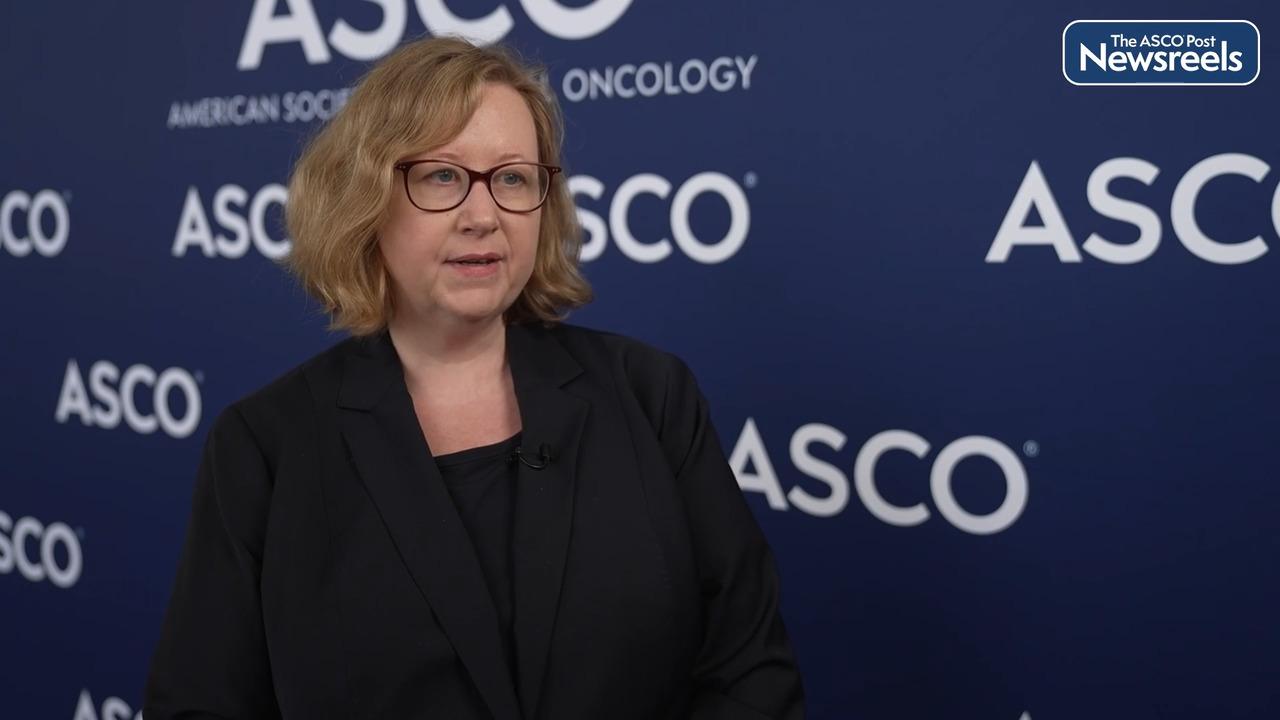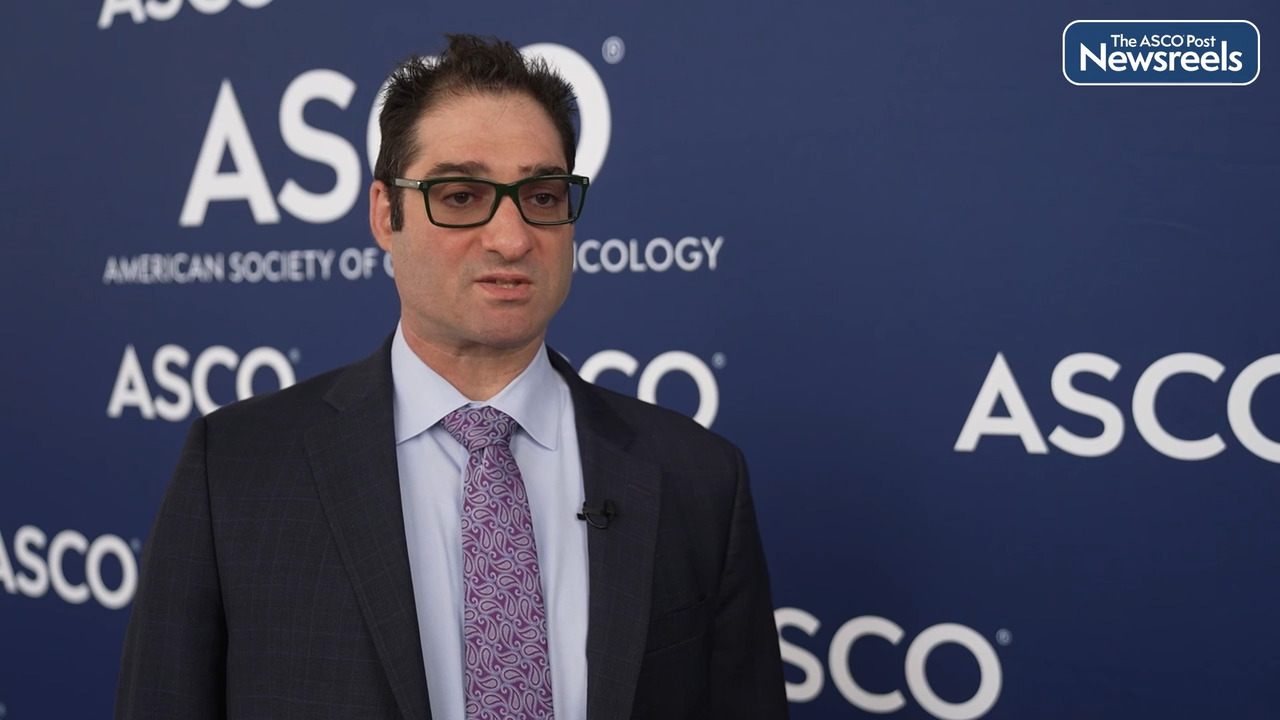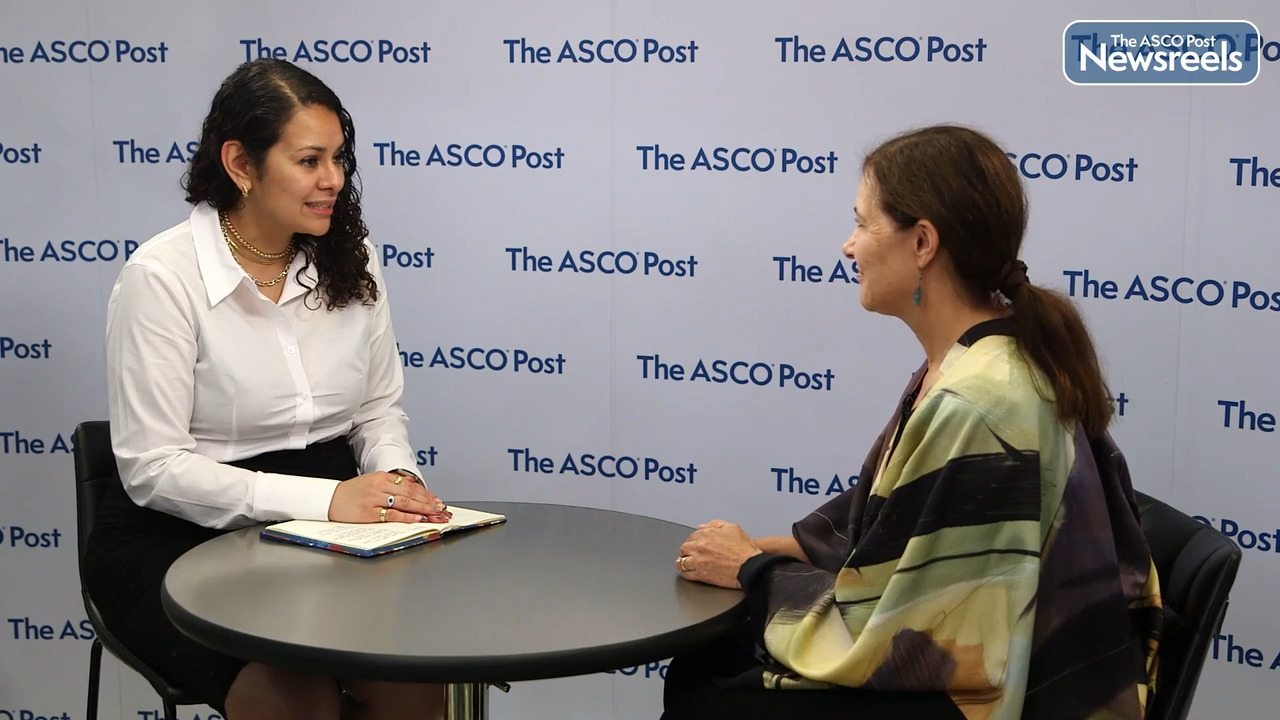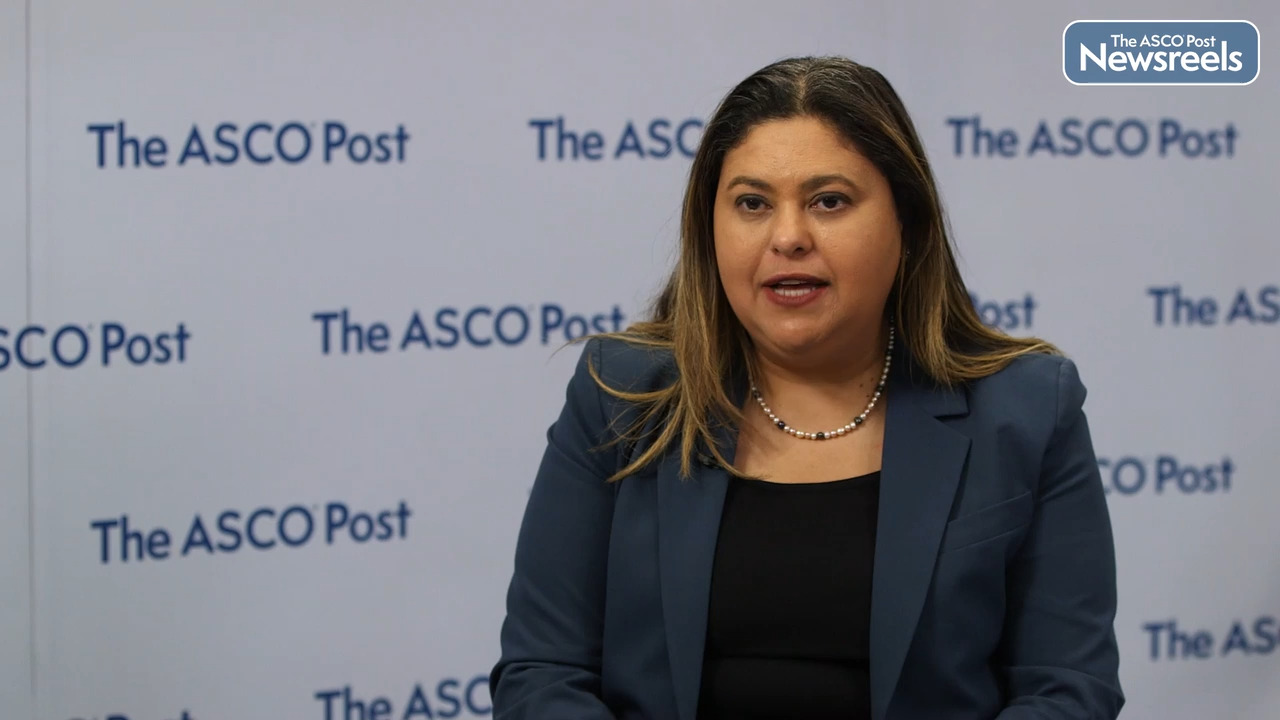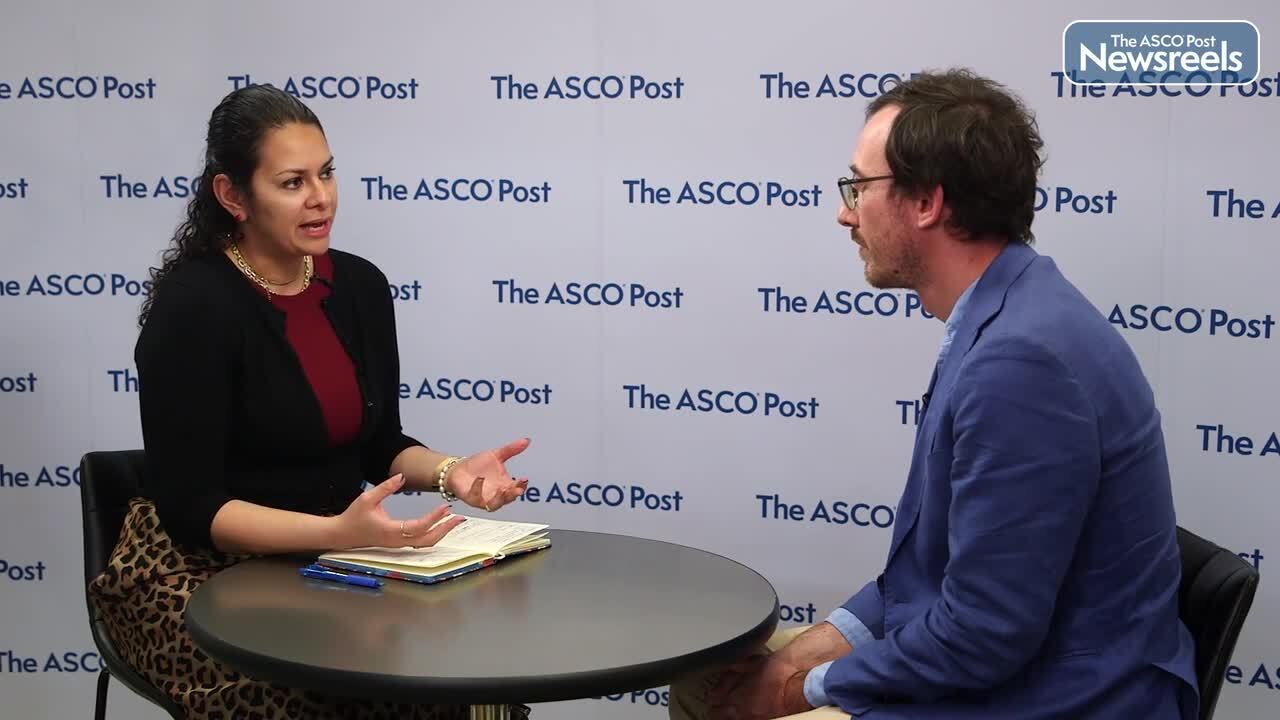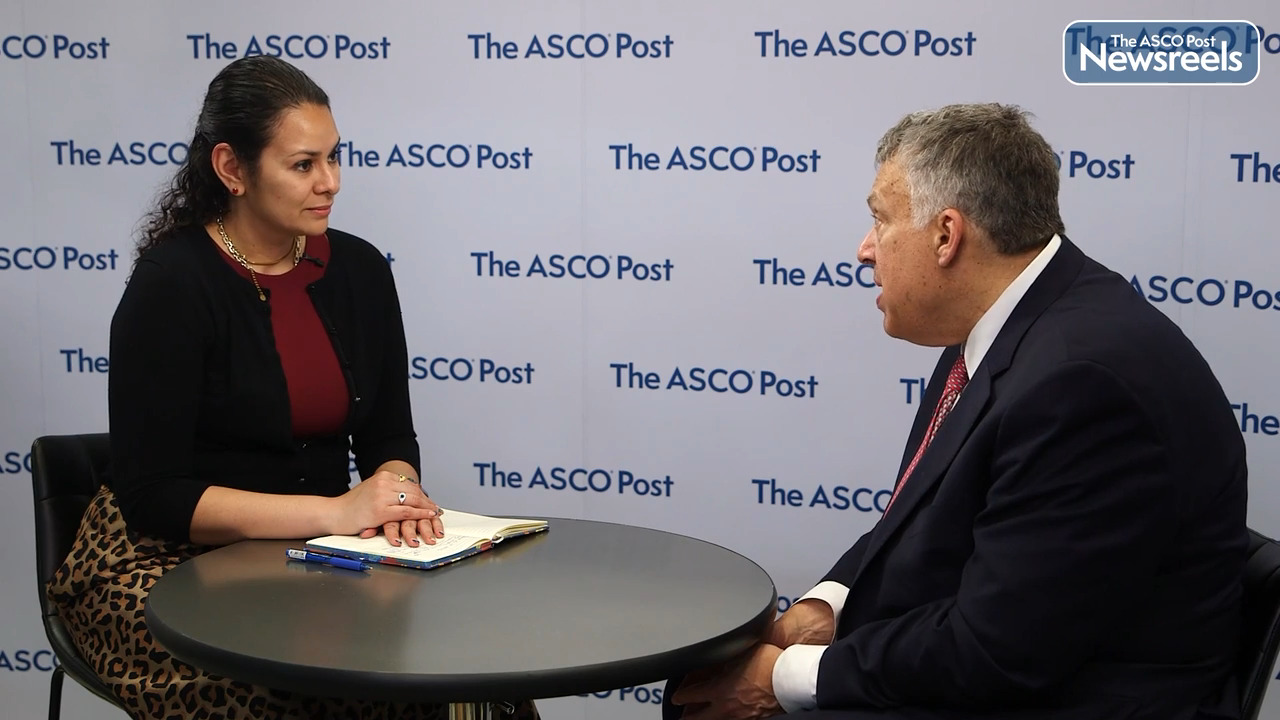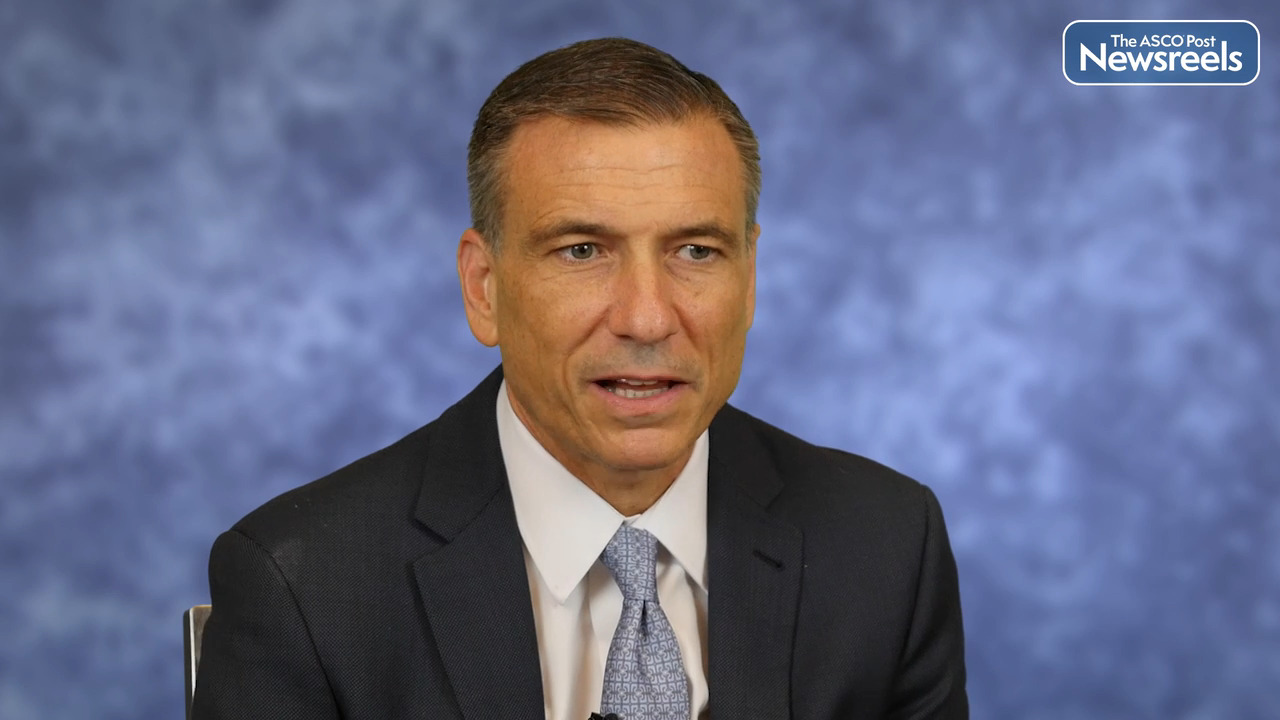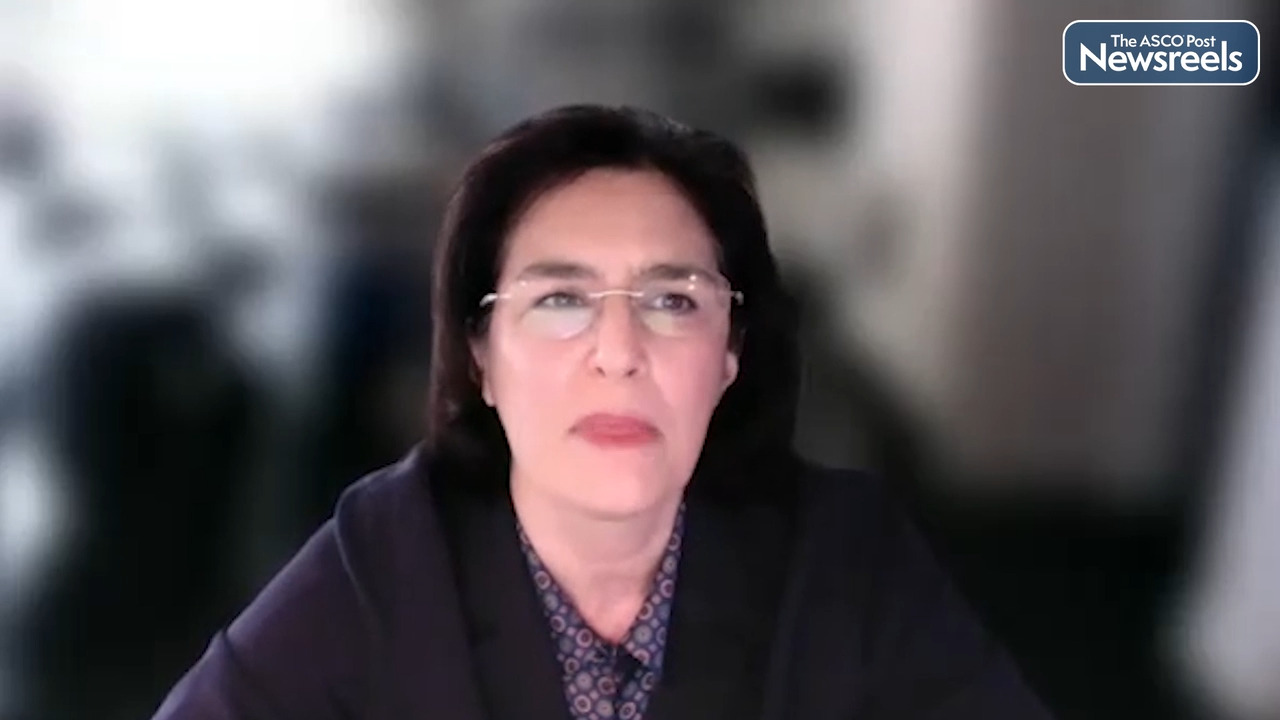Penelope Bradbury, MBChB, on Pleural Mesothelioma: New Results From the IND227 Trial of Cisplatin and Pemetrexed With or Without Pembrolizumab
Penelope Bradbury, MBChB, of Canada’s Princess Margaret Cancer Centre, discusses phase III findings showing that, in patients with treatment-naive unresectable pleural mesothelioma, cisplatin and pemetrexed with pembrolizumab improved median overall survival with acceptable tolerability (Abstract LBA8505).
Jonathan W. Riess, MD, on EGFR-Mutated Non–Small Cell Lung Cancer: What’s Next?
Jonathan W. Riess, MD, of the University of California, Davis Comprehensive Cancer Center, explores the findings of three important clinical trials in lung cancer treatment: whether to incorporate immune checkpoint inhibitors into the treatment of EGFR-mutated lung cancer, the importance of central nervous system activity in EGFR-mutant lung cancer, and new therapies for disease with EGFR exon 20 insertion.
Narjust Florez, MD, and Heather A. Wakelee, MD, on Early-Stage NSCLC: Phase III Findings From KEYNOTE-671 on Pembrolizumab and Platinum-Based Chemotherapy
Narjust Florez, MD, of Dana-Farber Cancer Institute, and Heather A. Wakelee, MD, of Stanford University, Stanford Cancer Institute, discuss new data supporting neoadjuvant pembrolizumab plus chemotherapy followed by surgery and adjuvant pembrolizumab as a promising new treatment option for patients with resectable stage II, IIIA, or IIIB (N2) non–small cell lung cancer (NSCLC) (Abstract LBA100).
Nagla Abdel Karim, MD, on Small Cell Lung Cancer: SWOG S1929 Results on Atezolizumab Plus Talazoparib
Nagla Abdel Karim, MD, of the Inova Schar Cancer Institute, University of Virginia, discusses phase II data showing that maintenance atezolizumab plus talazoparib improved progression-free survival in Schlafen-11–selected patients with extensive-stage small cell lung cancer. This study demonstrated the feasibility of conducting biomarker-selected trials in this disease, paving the way for future evaluation of novel therapies in selected populations (Abstract 8504).
Narjust Florez, MD, and Filippo Gustavo Dall’Olio, MD, on NSCLC: New Findings on Tumor Fraction, Durvalumab, and Survival
Narjust Florez, MD, of Dana-Farber Cancer Institute, and Filippo Gustavo Dall’Olio, MD, of Institut Gustave Roussy, discuss circulating tumor DNA tumor fraction, and its link to survival in patients with advanced non–small cell lung cancer (NSCLC) treated with maintenance durvalumab in the UNICANCER SAFIR02-Lung/IFCT1301 trial. Tumor fraction was positive in 16% of patients randomly assigned to receive durvalumab in the study. This population seems to have a limited benefit from maintenance durvalumab after induction chemotherapy (Abstract 2516).
Narjust Florez, MD, and Roy S. Herbst, MD, on NSCLC: Overall Survival Analysis From the ADAURA Trial of Osimertinib
Narjust Florez, MD, of Dana-Farber Cancer Institute, and Roy S. Herbst, MD, PhD, of Yale Cancer Center, discuss new phase III findings on osimertinib, a third-generation, central nervous system EGFR-TKI, which demonstrated an unprecedented overall survival benefit for patients with EGFR-mutated, stage IB–IIIA non–small cell lung cancer after complete tumor resection, with or without adjuvant chemotherapy (Abstract LBA3).
Adjuvant Osimertinib Improves Survival in Patients With Resected EGFR-Mutated NSCLC
Treatment with osimertinib after surgery significantly lowered the risk of death in adults with completely resected EGFR-mutated stage IB, II, or IIIA non–small cell lung cancer (NSCLC), according to the findings of the international ADAURA study. The research was presented at the 2023 ASCO Annual...
Patients With SLFN11-Expressing SCLC May Benefit From Immune Checkpoint Inhibitor Plus PARP Inhibitor
Among patients with extensive-stage small cell lung cancer (SCLC) positive for expression of the Schlafen-11 gene (SLFN11), those who received maintenance treatment with the immune checkpoint inhibitor atezolizumab plus the PARP inhibitor talazoparib had significantly longer progression-free...
A Leader in Oncology From Humble Beginnings Never Forgets Life Lessons Learned Along the Way
In December 2019, Robert A. Winn, MD, became the second Black physician to lead a National Cancer Institute (NCI)-designated comprehensive cancer center when he took the helm of the Virginia Commonwealth University (VCU) Massey Cancer Center. Dr. Winn’s basic science research, which has been...
Incidence of Colorectal, Lung, and Breast Cancers May Be Rising Due to COVID-19–Related Screening Delays
Delays in cancer screenings during the COVID-19 pandemic may have resulted in lower reported incidences of colorectal, lung, and breast cancers, reflecting potentially high rates of undiagnosed cancer and later-stage diagnoses, according to a new study published by Romatoski et al in the Journal of ...
Long-Term Outcomes With Single-Fraction vs Multifraction SABR for Pulmonary Oligometastases
As reported in the Journal of Clinical Oncology by Shankar Siva, PhD, and colleagues, long-term outcomes of the Trans Tasman Radiation Oncology Group (TROG) 13.01 SAFRON II phase II trial showed no difference in overall survival with single-fraction vs multifraction stereotactic ablative body...
Organizations Team Up to Improve Cancer Care in Rural Appalachia
The Appalachian Community Cancer Alliance (ACCA) has launched a lung cancer screening initiative to improve cancer care in rural Appalachia. Home to nearly 26 million people, the Appalachian region includes all of West Virginia and parts of 12 other states, and it has a 10% higher cancer mortality...
Does Prediagnosis Smoking Cessation Improve Overall Survival in Patients With NSCLC?
In a cohort study reported in JAMA Network Open, Wang et al found that overall survival in patients with non–small cell lung cancer (NSCLC) who stopped smoking prior to their cancer diagnosis was better than overall survival among those who were current smokers at the time of their diagnosis. Study ...
Cancer-Specific Mortality Rates Vary Widely Across the Globe, Study Finds
Investigators have found that in the majority of countries studied, the recent mortality rates for all major cancer types have decreased except for lung cancer among female patients and hepatic cancer among male patients—where increasing rates were observed in most countries, according to a novel...
An Incidental Finding of Cancer Likely Saved My Life
Except for a ganglion cyst that had mysteriously popped up on the palm of my right hand in the winter of 2016, I appeared to be in excellent health. I had never had any serious illnesses in my then 55 years and rarely even got colds. If the annoying cyst hadn’t interfered with my normal daily...
Detection of Early Emphysema During Lung Cancer Screening: Opportunities to Optimize Health
In an article in Annals of the American Thoracic Society, James L. Mulshine, MD, of the Center for Healthy Aging, Department of Medicine, Rush University, and colleagues maintained that the high frequency of emphysema newly identified during low-dose computed tomography (CT) lung cancer screening...
ASCO Releases Guideline Updates for Stage IV NSCLC With and Without Driver Alterations
ASCO has updated two living guidelines on the systemic treatment of stage IV non–small cell lung cancer (NSCLC) with and without driver alterations with the inclusion of new evidence-based treatment recommendations.1,2 Among the updates, the guidelines add the recently approved RAS GTPase family...
Amivantamab Shows Efficacy in Advanced NSCLC With EGFR Exon 20 Insertions
Amivantamab-vmjw, an EGFR and MET bispecific monoclonal antibody, has demonstrated encouraging long-term benefits and consistent efficacy in patients with advanced non–small cell lung cancer (NSCLC) with EGFR exon 20 insertions, according to data presented by Pilar Garrido, MD, PhD, Associate...
Front-Line vs Sequential Use of Osimertinib in EGFR-Mutant NSCLC: Potential Impact of Liquid Biopsies
Using liquid biopsies to detect circulating tumor DNA (ctDNA) may soon transform treatment strategies for patients with advanced EGFR-mutant non–small cell lung cancer (NSCLC), according to data presented during the European Lung Cancer Congress 2023 by lead study author Jordi Remon, MD, PhD, of...
CheckMate 816: 3-Year Update Shows Improved Event-Free Survival With Neoadjuvant Nivolumab and Chemotherapy for Resectable NSCLC
The combination of neoadjuvant nivolumab plus chemotherapy continues to demonstrate potential as a standard treatment for patients with resectable non–small cell lung cancer (NSCLC), according to data presented during the European Lung Cancer Congress 2023.1 The 3-year update from the phase III...
CodeBreaK 200: Sotorasib Offers Improved Quality of Life for Patients With Previously Treated NSCLC
The latest research on sotorasib, a targeted therapy for KRAS G12C–mutated non–small cell lung cancer (NSCLC), reveals that patients may experience better quality of life while benefiting from improved clinical outcomes. Analysis of patient-reported outcomes presented during the European Lung...
Lung Cancer Screening and Possible Unappreciated Benefits
Screening that reduces cancer mortality serves as a foundational element of impactful care for certain cancers. That said, harms related to screening deserve our attention—overdiagnoses; diagnostic odysseys that may be invasive, expensive, or even unintentionally harmful; overtreatment of diagnosed ...
AEGEAN Trial Shows Benefit With Immunotherapy-Based Combination for NSCLC
Patients with treatment-naive resectable non–small cell lung cancer (NSCLC) treated with neoadjuvant durvalumab plus chemotherapy and adjuvant durvalumab monotherapy had improved event-free survival and pathologic complete response rates compared with those who received neoadjuvant chemotherapy...
Sotorasib in Pretreated Patients With KRAS G12C–Mutated NSCLC: 2-Year Analysis of CodeBreaK100
In an analysis published in the Journal of Clinical Oncology, Grace K. Dy, MD, and colleagues report 2-year outcomes of the CodeBreaK100 phase I/II trial of sotorasib in previously treated patients with KRAS G12C–mutated locally advanced or metastatic non–small cell lung cancer (NSCLC). According...
Novel AI Model Offers Potential for Earlier Lung Cancer Diagnoses
A new artificial intelligence (AI) model could help physicians diagnose lung cancer earlier, according to a study published by Hunter et al in eBioMedicine. The findings suggested that the new model may yield a diagnosis more quickly and potentially more accurately than two existing risk assessment ...
ASTRO and ESTRO Issue New Clinical Guidelines on Local Therapy for Patients With Oligometastatic NSCLC
The American Society for Radiation Oncology (ASTRO) and the European Society for Radiotherapy & Oncology (ESTRO) provided advice on the use of definitive local therapy—including radiation and surgery—to treat patients with oligometastatic non–small cell lung cancer (NSCLC), according to new...
Toripalimab Plus Chemotherapy May Improve Event-Free Survival in Resectable Stage III NSCLC
An interim analysis of the Neotorch study highlighted the potential of immunotherapy for the treatment of early-stage non–small cell lung cancer (NSCLC), according to data presented by Lu et al during the ASCO Plenary Series: April 2023 Session (Abstract 425126). The findings showed a significant...
Study Identifies Mutations That May Be Associated With Poor Outcomes in Patients With NSCLC Treated With KRAS G12C Inhibitors
Researchers have discovered that co-occurring mutations in three tumor-suppressor genes—KEAP1, SMARCA4, and CDKN2A—may be linked with poor clinical outcomes in patients with KRAS G12C–mutant non–small cell lung cancer (NSCLC) who were treated with the KRAS G12C inhibitors adagrasib or sotorasib,...
VT3989 May Be Safe, Effective in Patients With Advanced Mesothelioma and NF2-Mutant Solid Tumors
The yes-associated protein (YAP)/transcriptional enhancer activator domain (TEAD) inhibitor VT3989 may have been well tolerated with durable antitumor responses in patients with advanced malignant mesothelioma as well as other NF2-mutated solid tumors, according to new findings presented by Yap et...
Study Finds Lung Cancer Incidence Rates Vary Significantly Among Florida’s Black and Hispanic Ethnic Subgroups
An analysis of lung cancer incidence rates showed wide variations among the racial and ethnic subgroups in Florida’s Black and Hispanic population, according to data presented by Cranford et al at the American Association for Cancer Research (AACR) Annual Meeting 2023 (Abstract 1902/8). Study...
John V. Heymach, MD, PhD, on NSCLC: New Data on Durvalumab Plus Chemotherapy From the AEGEAN Trial
John V. Heymach, MD, PhD, of The University of Texas MD Anderson Cancer Center, discusses phase III results from the AEGEAN trial, which showed that patients with treatment-naive, resectable, non–small cell lung cancer (NSCLC) who received neoadjuvant durvalumab plus chemotherapy and adjuvant durvalumab monotherapy had improved event-free survival and pathologic complete response, compared with those who received neoadjuvant chemotherapy alone. (Abstract CT005)
Neoadjuvant Durvalumab Plus Chemotherapy Followed by Adjuvant Durvalumab in Patients With Resectable NSCLC: AEGEAN Trial
Treatment-naive patients with resectable non–small cell lung cancer (NSCLC) who received neoadjuvant durvalumab plus chemotherapy and adjuvant durvalumab monotherapy had improved event-free survival and pathologic complete response compared with those who received neoadjuvant chemotherapy alone,...
Confirmatory Mediastinoscopy vs Immediate Resection After Endosonography for Resectable NSCLC
In a trial (MEDIASTrial) reported in the Journal of Clinical Oncology, Bousema et al found that immediate lung tumor resection after negative systematic endosonography was noninferior to confirmatory mediastinoscopy in the detection of unforeseen N2 disease in patients with non–small cell lung...
Pragmatica-Lung Trial Begins Enrolling Patients With NSCLC Who Did Not Respond to Previous Therapy
The National Cancer Institute (NCI) announced that it has helped launch the randomized phase III Pragmatica-Lung trial examining the efficacy of ramucirumab plus pembrolizumab in treating patients with advanced non–small cell lung cancer (NSCLC). The new study is one of the first NCI-supported...
Genetics Likely Caused My Small Cell Lung Cancer
When I was diagnosed with lung cancer, in 2007, I asked the physician not to tell me the type, stage, or prognosis. I was about to start nursing school and was aware enough about the disease to know that not many people survived. I’ve since discovered that I had stage 3B small cell lung cancer,...
Ella A. Kazerooni, MD, on Lung Cancer Screening: Benefits and Challenges
Ella A. Kazerooni, MD, of the University of Michigan Rogel Cancer Center, discusses reducing cancer deaths in the United States by identifying patients at risk for lung cancer. Engaging with primary care physicians and facilitating referrals are keys to a successful lung cancer screening program, she says, as is working with a nurse care coordinator.
ELCC 2023: New Data on Amivantamab-vmjw in Patients With Advanced NSCLC and EGFR Exon 20 Insertion Mutations
New long-term data from the CHRYSALIS study evaluating amivantamab-vmjw in patients with advanced non–small cell lung cancer (NSCLC) and EGFR exon 20 insertion mutations whose disease progressed on prior platinum-based chemotherapy were presented by Lopez et al at the 2023 European Lung Cancer...
Sotorasib Improves Progression-Free Survival vs Docetaxel in Previously Treated Advanced NSCLC With KRAS G12C Mutation
As reported in The Lancet by Adrianus Johannes de Langen, MD, PhD, of the Netherlands Cancer Institute, Amsterdam, and colleagues, the phase III CodeBreaK200 trial has shown a small but significant improvement in progression-free survival with sotorasib vs docetaxel in previously treated advanced...
Neoadjuvant Dual Immunotherapy Plus Chemotherapy Improves Patient Outcomes in Operable Lung Cancer
In the phase II NEOSTAR trial, adding ipilimumab to a neoadjuvant combination of nivolumab plus platinum-based chemotherapy resulted in a major pathologic response in half of all treated patients with early-stage, resectable non–small cell lung cancer (NSCLC). New findings from the NEOSTAR study,...
Detection of Emphysema During Lung Cancer Screening
In an article published in Annals of the American Thoracic Society, James L. Mulshine, MD, and colleagues maintained that the high frequency of emphysema newly identified during low-dose computed tomography (CT) lung cancer screening presents an important opportunity to engage individuals with such ...
I’m Doing My Part to Erase the Stigma Surrounding Lung Cancer
Ironically, I received a diagnosis of lung cancer when I was feeling my healthiest. In December 2015, when I was just 51 years old, a routine chest x-ray found a small shadow on the lower lobe of my right lung. Despite being a never-smoker, a regular exerciser, and a healthy eater, my primary care...
Depression May Be Linked to Higher Levels of Inflammation, Poorer Outcomes in Patients With Lung Cancer
Patients with lung cancer who have moderate to severe depression may be two to three times more likely to have inflammation levels that predict poor survival rates, according to a new study published by Andersen et al in PLOS One. The findings may help explain why a substantial portion of patients...
Hormone Therapy May Reduce Risk of Lung Cancer in Female Patients, Despite Former Misperceptions
Investigators have demonstrated that, despite some commonly held misperceptions, hormone therapy doesn’t increase patients’ risk of developing lung cancer—and it could help reduce the risk, according to a 16-year population-based study published by Wu et al in Menopause. The findings may help...
Addition of Pembrolizumab to Pemetrexed/Platinum in the First-Line Treatment of Metastatic Nonsquamous NSCLC: 5-Year Outcomes in the KEYNOTE-189 Study
As reported in the Journal of Clinical Oncology by Marina C. Garassino, MD, and colleagues, 5-year follow-up in the phase III KEYNOTE-189 trial has shown maintained progression-free and overall survival benefits with the addition of pembrolizumab to pemetrexed and platinum chemotherapy in the...
Association of Immune-Related Adverse Events With Overall Survival in Patients Receiving Atezolizumab-Containing Therapy for Metastatic Nonsquamous NSCLC
In a pooled analysis reported in JAMA Oncology, Mark A. Socinski, MD, and colleagues found that patients with nonsquamous non–small cell lung cancer (NSCLC) receiving atezolizumab who had grade 1 or 2 immune-related adverse events in clinical trials had improved overall survival vs those with no...
ASCO Updates ‘Living’ Guidelines on Stage IV NSCLC Based on DESTINY-Lung01, CodeBreaK100, Other Trials
ASCO has updated its living guidelines for therapy for stage IV non–small cell lung cancer (NSCLC) with and without driver alterations based on newly available evidence in the field.1,2 “Living guidelines are becoming more important as the field of oncology expands and developments occur more...
Updated Results From the ADAURA Trial: Continued Disease-Free Survival Benefit With Adjuvant Osimertinib vs Placebo in EGFR-Mutated Stage IB–IIIA NSCLC
As reported in the Journal of Clinical Oncology by Roy S. Herbst, MD, PhD, of Yale Cancer Center and Yale School of Medicine, and colleagues, updated findings in the phase III ADAURA trial showed continued disease-free survival benefit with adjuvant osimertinib vs placebo after complete resection...
Yale Study Indicates Older Patients Are Excluded From Progress Against Lung Cancer
The widespread use of immune checkpoint inhibitors has led to significant benefits in younger patients with advanced lung cancer; however, older patients have not experienced similar survival benefits, according to research from Yale Cancer Center. The study was published in JAMA Oncology.1 “There ...
Study Finds Neoadjuvant Nivolumab Led to Improved 5-Year Survival Outcomes in Patients With Resectable NSCLC
Lung cancer remains the most commonly diagnosed cancer and the leading cause of cancer-related death worldwide, causing nearly 2 million deaths a year. Although treatment advances in late-stage non–small lung cancer (NSCLC) are extending survival in some patients, breakthroughs for early-stage...
CodeBreaK 200 Trial: Sotorasib vs Docetaxel in Previously Treated Patients With Advanced KRAS G12C–Mutated NSCLC
As reported in The Lancet by de Langen et al, the phase III CodeBreaK 200 trial has shown a significant improvement in progression-free survival with sotorasib vs docetaxel in previously treated patients with advanced KRAS G12C–mutated non–small cell lung cancer (NSCLC). Study Details In the...
